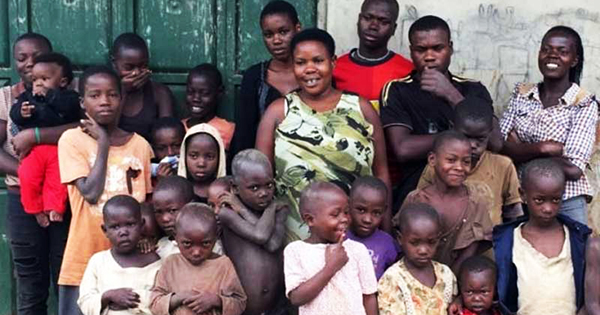
Kampala, Uganda — Mariam Nabatanzi, a 39-year old woman from Uganda who was married off at the age of 12, has given birth to 44 children from 15 pregnancies. Since her husband abandoned them three years ago, she is left to support all of her 38 surviving children alone.Nabatanzi was 13 years old when she gave birth to her first set of twins. The doctor then told her she had unusually large ovaries and advised her to avoid birth control pills due to the health problems it might cause.
So the children kept coming. She gave birth to five more sets of twins, four sets of triplets, and five sets of quadruplets. Out of them all, she already lost six children, most recently during her last pregnancy when one of the twins died two years ago.
In Africa, specifically in Uganda, family sizes are at their largest with a fertility rate of 5.6 children per woman — more than twice the global average of 2.4 children, according to the World Bank. Despite that, Nabatanzi’s family is still extremely, unusually large. And with her husband out of the picture, she is struggling to provide for them.
“I have grown up in tears, my man has passed me through a lot of suffering. All my time has been spent looking after my children and working to earn some money,” she tearfully said in an interview with Reuters.
Desperate to earn money, Mariam does everything from hairdressing, event decorating, collecting and selling scrap metal, brewing local gin and selling herbal medicine. The money all goes to expenses on food, medical care, clothing, and school fees. Her greatest compensation hangs on their home — the proud portraits of some of her children graduating from school with gold tinsel around their necks.
Her son Ivan Kibuka, who is 23 years old and had to drop out of secondary school when they ran out of money, said, “Mum is overwhelmed, the work is crushing her, we help where we can, like in cooking and washing, but she still carries the whole burden for the family. I feel for her.”
Nabatanzi had a rough childhood after her mother left her with her father and her five siblings three days after she was born. Her dad eventually remarried and her stepmother killed her five older siblings by poisoning them with crushed glass mixed in their food. She couldn’t have survived as well if she wasn’t visiting a relative at that time.
“I was seven years old then, too young to even understand what death actually meant. I was told by relatives what had happened,” she said.
Since then, she wanted to have six children to somehow rebuild her shattered family. But actually having 38 children and providing for all of them alone is a constant challenge.
She is now living with her children, who were between 2 and 23 years old, in four cramped houses made of cement blocks topped with corrugated iron in a village in Kampala. Twelve children share one small room where they sleep in metal bunk beds with thin mattresses. Other children pile onto shared mattresses while others sleep on the dirt floor.
Older children help her look after the younger ones. Everyone has their share in helping with chores like washing or cooking. Each day, they consume about 25 kilograms of maize flour. It would be a rare feast whenever there’s fish or meat.
Having experienced hardships herself, she now just wishes for her children’s happiness.
“I started taking on adult responsibilities at an early stage. I have not had joy, I think, since I was born.”
